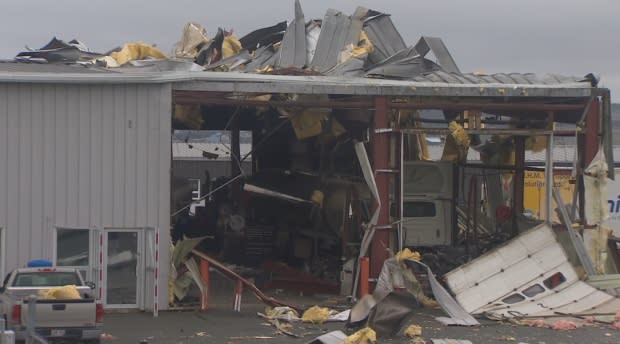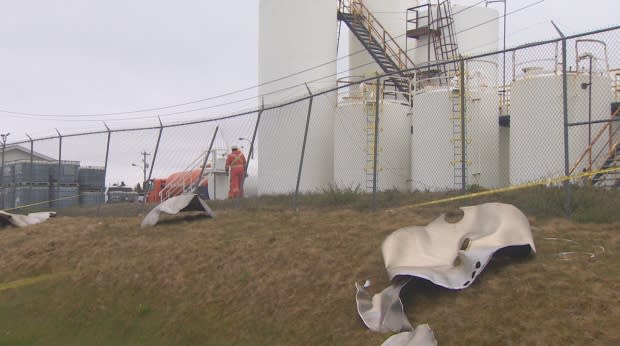Failure to properly test for ignitable vapours led to Mount Pearl explosion: report
Failure to follow safety procedures by both employees and management led to an explosion at Trimac Transportation Services in Mount Pearl that sent three people to hospital last spring.
"The explosion could have been avoided if procedures were followed on June 19, 2018," says a federal report obtained by CBC News.
The Employment and Social Development Canada Labour Program Hazardous Occurrence report outlines the events and errors that caused the disaster at Donovan's Business Park.
Federal, not provincial, investigators are called in when an incident occurs at a transportation company in Canada.
Investigators said that minutes before the blast, a mechanic was on his knees under a fuel trailer, welding a vapour recovery pipe that was part of the fuel tank. That welding sparked fuel fumes in the trailer, causing the explosion, says the report.
The report also describes what an investigator with the Royal Newfoundland Constabulary's bomb disposal unit believes happened next.
RNC Const. Colin Deacy explained the explosion likely caused the trailer to shoot upward, hit the ceiling and then bounce back.
Trimac's roof was left a shredded mess of metal and insulation. Large pieces of flying metal narrowly missed a nearby fuel tank farm.
Nine people were inside Trimac at the time. Somehow, no one died. Even the mechanic who had been welding under the truck walked away. The mechanic was, however, one of three people taken to hospital with minor injuries.

The report says failures by both the mechanic and supervisors led to the explosion; it says the mechanic didn't properly test the truck for ignitable fumes and he should have known not to weld part of a tank that had recently been carrying fuel. Investigators also said the trailer truck that was carrying fuel before the explosion wasn't properly tested for ignitable vapours.
"Gas testing procedures were not followed in accordance with Trimac's safety procedures," they wrote.
Mechanic errors
The report says the mechanic gave investigators inconsistent statements. He told them all necessary procedures were carried out, but information gathered from the equipment he used showed not all procedures had been followed.
"Employees did not complete gas testing in all required areas. The gas testing should take approximately 45 minutes. However, on June 18, the gas meter was on for a two-minute and a four-minute interval."
The report says the mechanic also should have known not to weld part of a tank that had been carrying fuel because a yellow tag had been placed on the truck that clearly said: "No hot work can be performed on any part of the tank. This includes: welding, torch cutting or grinding."
Management errors
Management also made mistakes. The report says the mechanic's supervisor "assumed proper procedures were followed based on the fact that the paperwork had been filled out."
"However, during a witness statement it was confirmed that he did not actually observe these these tasks being completed," said the report.

After speaking with several employees, the federal investigators said they found these were not isolated incidents.
"In general, employees do not follow the appropriate gas testing as outlined in Trimac's procedures. Improper gas testing for ignitable vapours is a systemic issue at this work site," they wrote.
The result
No criminal charges or Occupational Health and Safety charges were laid, but federal investigators did recommend improved safety training for Trimac management and employees.
After the explosion, the employer did take corrective measures to ensure employees and supervisors understand and observe safety procedures.
The mechanic who sparked the explosion no longer works at Trimac and the maintenance shop where he worked in Mount Pearl never reopened.
Read more from CBC Newfoundland and Labrador


